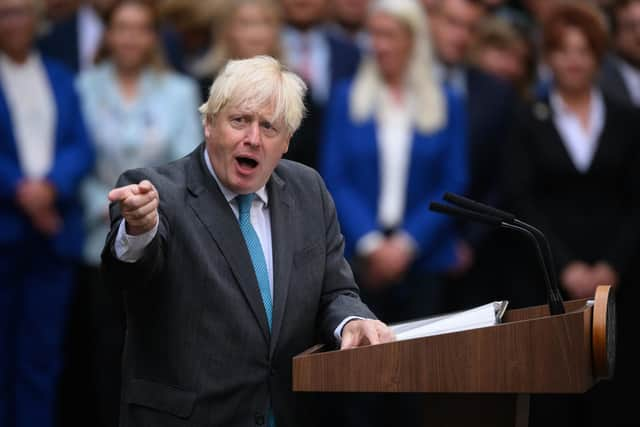Voters care about opportunity, not pathetic division politics and culture wars - Justine Greening
Yet my columns have generally focused on one of the biggest challenges Britain faces, one that underpins many others - weak social mobility. Back in 2018 I’d launched my Social Mobility Pledge campaign, encouraging businesses to be more active in using their opportunities to change lives for the better. It’s tapped into the huge goodwill many organisations have for taking positive action.
But in a Brexit-stricken Parliament, I often felt like a lone voice in my party. In one Parliamentary debate on social mobility, just a handful of Conservative MPs participated.
Advertisement
Hide AdAdvertisement
Hide AdThat all changed when Boris Johnson supplanted Theresa May. He took the ‘levelling up’ mantra that had framed my strategy as Education Secretary and rightly put it in the political centre stage. Whatever Mr Johnson’s qualities and patent failings, his electoral success has stemmed from an instinctive sense of the political zeitgeist of what people feel needs to change. Of all the leadership candidates in 2019, he was the only one to instinctively grasp my message that improving social mobility had to be top of the agenda. Levelling up became a key mantra for him too.


There’s no doubt that the 2019 election fought by Boris Johnson was about resolving the Brexit logjam in Parliament. But it was surely for a greater purpose - to create a fairer version of Britain. ‘Take back control’ and ‘levelling up’ both resonated with red wall voters, but at a more fundamental, personal level. It was about a version of Britain with a level playing field of opportunity, irrespective of connections and circumstance. We all know that it’s better for all of us when this becomes a country where we all have space to succeed. It was about sovereignty, but for people and their families as much as for Britain.
That was the ‘levelling up’ promise that people in Yorkshire and other ‘red wall’ communities across the north of England bought into and which drove Boris Johnson’s 2019 landslide victory. A whole swathe of red-wall voters were prepared to set aside a political norm of life-long support of the Labour Party to get the change they wanted.
As we reach the end of this Parliament and look ahead to the next election in 2024, we can see that for those voters, nowhere near enough of the promise to ‘level up’ has been kept. For me, levelling up wasn’t just about political policymaking, it was about a broader societal shift on access to opportunities that extended far beyond Westminster and City Hall into our corporate world, universities and civil society. Yet for Mr Johnson’s administration it ended up restricted to a much more traditional political plan - big capital spending in local communities. Ultimately if we’ve discovered one thing during this Parliament, it’s that Whitehall hasn’t sufficient capability or understanding of levelling up to design policy that makes a long term difference.
Advertisement
Hide AdAdvertisement
Hide AdAs we roll the clock forward further, we have a Prime Minister, Rishi Sunak, who failed to even mention levelling up in his October Conference speech.
With some opinion polls showing the Conservatives at just 19 per cent, and Rishi Sunak’s personal ratings at an all time low, it’s impossible not to conclude that the Conservative Party fortunes ebb and flow with its message and delivery on levelling up and social mobility. When it is at the core of the party’s message, and voters trust it to deliver, it polls high. When it is set aside, that support disappears.
Of course, that is something that the Opposition Labour Party now understands. The more Sir Keir Starmer has talked about ‘breaking down barriers’ to opportunity, the better he has done in the opinion polls. And behind all of this is a reality - the purpose that drove red wall voters to radically switch from Labour to Conservative in 2019 still remains. They want to see a Government - any Government - prioritise equality of opportunity and deliver it in a way that has real impact on their lives. To do so is the antithesis of the pathetic division politics and culture wars that have been the modus operandi of so many politicians we see on the nightly news. They are arguing not delivering. Dividing instead of uniting.
The reality is that Britain is united - united in wanting to see true equality of opportunity. Every time voters get the chance to vote for a party they think can deliver social mobility, they do. In a sense, Brexit unmoored many voters from their usual political home. It has embedded a voter volatility into our system we have not seen before.
Advertisement
Hide AdAdvertisement
Hide AdAnd for political parties like the Conservative Party, apparently facing the prospect of going straight from a landslide victory to a landslide defeat, the only option for survival is to get back to the purpose that people voted them into power to deliver on in the first place - social mobility.
This is my final Saturday column after five years of having the huge privilege of writing for The Yorkshire Post, a paper that I grew up reading and that nurtured my own political awareness. But I feel it’s time for a fresh voice for weekend readers. I’ll still be contributing to the paper regularly but in the meantime, thanks for reading and commenting on my columns.
Justine Greening, born and raised in Rotherham, is a former Secretary of State for Education.
Comment Guidelines
National World encourages reader discussion on our stories. User feedback, insights and back-and-forth exchanges add a rich layer of context to reporting. Please review our Community Guidelines before commenting.